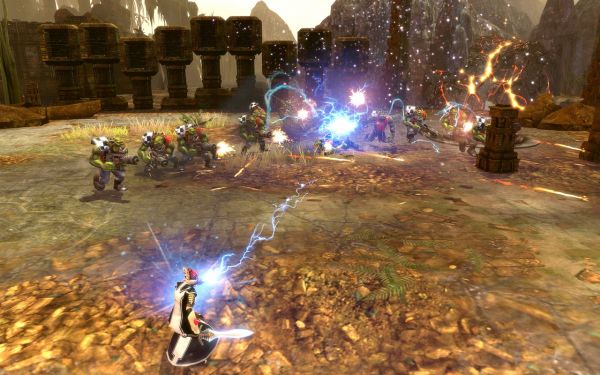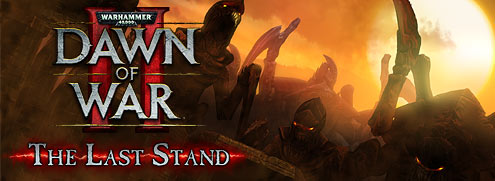As Mike and Nick discussed in the 28th episode of the Co-Opticast, there was a study conducted at the University of Missouri to compare competitive gaming to co-op gaming. While the study didn’t go to too great depths to test the effects of co-op vs competitive gaming, the summary suggested that aggressive games (and gaming) appeal to young men as it allows them to participate in that primal male-male competition for dominance. This phenomenon, unfortunately, isn’t always limited to competitive gaming. There is that occasional aggressive side to co-op, when the co-op experience turns from being a group working together to achieve a goal, to a group of individuals all attempting to achieve or prove something on their own. It is something that I myself was guilty of not that long ago.
As I’ve mentioned a few times on the site, I love Dawn of War II. The campaign co-op mode was a perfect way for two folks to go through the game together, and it made the game a wholly different experience as you could actually work out tactics with your teammate when faced with a tough situation. When the announcement came that there would be a free survival mode that would be added, I knew I would be playing it. And play it I did, for a good 4 or 5-days. What’s more, in a move that is different from how I normally co-op, I did random matches on-line. Such was my love for this game and this new play mode that I was willing to risk the unknown horrors of the vast Internet to play it. For the most part, my experiences playing with folks on-line matched those that Nick and others have shared from the Co-Op Nights we do here once a month. Folks are working together to achieve a common goal and do so with a very minimal amount of the usual aggression or, shall we say, less mature behavior that you typically find in the competitive multiplayer matches. Some groups I played with progressed quite a ways, others didn’t; but no one ever seemed upset if we died on the 7th wave or the 12th. In retrospect it was the smallest of things, but something happened that turned an enjoyable time to an experience that was more competitive and less co-operative.

Who's Last Stand? That's right, mine!
As Mike detailed in one of the This Week in Co-Op’s, and as I’ve been going on about on my Twitter account for some time, I’ve been having issues with my modem/router. I have pretty much gotten the kinks worked out, but occasionally there are little inconveniences. One such occurrence was during a game of Last Stand where, I suppose, my lag kept spiking. Now, Relic has a pretty good system set-up where if the lag begins to get to be too much, they’ll pause the action to let the players catch up. During a couple of matches, I played with some folks who experienced lag, but it was never any big deal. During this particular match, my lag was no worse than other matches I’ve been in; the game would pause for a few seconds every so often, but no one died and certainly the game wasn’t unplayable. Not all of my teammates shared that opinion, however.
Player: Hey LaggyPanther, why don’t you change your internet?
Me: To what?
Player: To something less laggy.
While, in my opinion, this was a bit of a jerk thing to say during a match (after all what could I do about it mid-game), I wasn’t really bothered by it and we all kept playing. Around the 9th wave, the really killer Eldar wave, both of my teammates (both Orcs) were down and I (the Eldar Farseer) was the only one left standing, as it were, amidst quite a few Eldar out for my blood. At a time when a player is basically the deciding factor between victory or defeat, my teammate had this to share:
Player: Bye bye LaggyPanther.
Looking back, I really don’t know what triggered it. It was, after all, such an insignificant comment, but it changed a mostly friendly co-op game into a battle of wills. I knew right then I was going to survive that wave. What’s more, I was going to survive that wave and leave that player for dead. I would revive my other teammate when the opportunity presented itself, and if he or she wanted to revive our fellow teammate, that was fine. Me? I was washing my hands of it. This was no longer about co-op gaming, it was about proving some stupid point (that my lag makes no difference if you’ve got the skill to deal with it) to this person I didn’t even know. We died on the next wave because I should have waited until our other teammate was revived and we were all up to strength before killing the last enemy from the previous wave. But I didn’t care that we lost; in my mind, I had proven something.
Human nature is such an odd beast. We crave, at times, to work together in groups, as the enjoyment of working with a group of people to overcome something that is difficult or challenging alone is a rewarding experience. Still, from time to time, we are unable to escape or avoid that more primal feeling that if our honor, skills, or, in this case, network connectivity is challenged, then we must respond; even if the reward for doing so is far less than the rewards obtained through co-operation. My experience with the Last Stand is one that I haven’t experienced in some time (the last was when I used to play WoW), and one that I don’t care to repeat any time soon. After all, I’d hate to be the one vector out there that disproves a scientific study.
